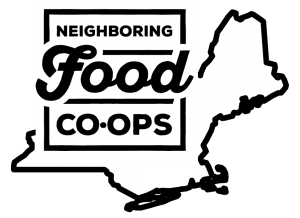
Your Neighboring Food Co-ops
Locally Owned by More Than
168,000 People Like You!
- Living Our Co-operative Identity
- Northeast Family Farm Partnership
- Supporting Black Farmer Debt Relief
- Our Neighboring Co-operator!
- Hope for Northeast Dairy Farms
- Slash Your Trash this April!
- Brattleboro Food Co-op Hires New General Manager
- March’s Cave to Co-op Artisan Cheese
- Co-op Jobs!
- Farmers Union: Fairness for Farmers
- Co-op Calendar
Living Our Co-operative Identity
On 19 March 2022, co-operators from across the Northeast gathered online for the Neighboring Food Co-op Association’s 11th Annual Meeting.
Organized around the theme of Living Our Co-operative Identity, the event brought together nearly 90 representatives from more than 49 food co-ops, startup initiatives, and partner organizations for celebrations, reflection, and networking.
representatives from more than 49 food co-ops, startup initiatives, and partner organizations for celebrations, reflection, and networking.
“As I look back over the past year, I am so amazed by the resilience of our co-ops and their generosity in supporting one another and their communities,” said Sue Miller, Neighboring Food Co-op Association (NFCA) President and Co-General Manager of Upper Valley Food Co-op. “We’ve not only adapted to rapidly changing conditions, we’ve also challenged ourselves to do more, and reached out to one another to share ideas and strategies for how we can be successful in our efforts.”
The theme of the gathering emphasized how food co-ops can leverage their Co-operative Identity for success. A keynote dialog with guest speakers Martin Lowery, U.S. Representative to the International Co-operative Alliance (ICA), and Alexandra Wilson, member of the Board of Directors of the ICA and Chair of the Alliance’s Co-operative Identity Advisory Group, focused on the foundation of the co-operative principles, their evolution over time, and current dialogs on how to ensure that co-operatives are relevant to the challenges and opportunities that we face today.
Considering the current crisis in Ukraine and debates about voting rights in the U.S., the speakers raised the contribution of co-ops to a more democratic society. “What if the case were that every co-operative is first and foremost a member-driven organization, thinking not about the product or service first but more about the community, the member relationship and so on?” asked Lowery. “If the co-op is operating genuinely within the principles and values… would that then possibly lead to an enlightenment around the idea that democratic principles and practices really do matter, that they’re really fundamental to how we achieve the best of ourselves as human beings, and therefore could co-operatives save democracy for the world?”
Wilson commented on the challenge of co-ops differentiating themselves in the marketplace, saying that, “if we agree this is our constant challenge, and we focus on it at both the board and management levels on a continuing basis, we’ll find ways to live our co-operative identity and distinguish ourselves.”
Wilson announced that the ICA will soon be sending out a survey to co-ops and their member to obtain input on the relevance of the Co-operative Identity to current challenges and opportunities in our economy and society.
The gathering also received greetings from Gary Hirshberg, Stonyfield Organics Co-Founder & Chair of the Northeast Organic Family Farm Partnership, Rob Larew, President of the National Farmers Union, and Dãnia Davy, Director of Land Retention & Advocacy for the Federation of Southern Cooperatives / Land Assistance Fund. (See videos of these remarks later in this e-newsletter.) Small group dialogs then focused on what co-ops are doing now to leverage their Co-operative Identity for success and how we can work together to inspire and increase our impact for communities desperate for positive change.
“There is no doubt that the past couple of years have been deeply challenging,” said NFCA Executive Director Erbin Crowell in his report to the membership. “But it has also been inspiring as we’ve worked together to support of our communities, our members and shoppers, our employees, and our suppliers.”
Over the past year, NFCA member co-ops have worked hard to keep employees and shoppers safe during the pandemic, while ensuring access to healthy food and supporting local producers. The association’s annual impact survey showed that in 2021, its over 40 member food co-ops and startups generated shared revenue of $395 million, over $100 million of which was sales of local products. More than 14,000 people joined their local food co-ops last year, bringing total membership to over 168,000. In addition to maintaining 2,450 jobs and community infrastructure, co-ops increased their support of local communities, donating over $1 million to non-profit organizations and returning $6.5 million to members in the form of discounts and patronage refunds.
In addition to reports from the NFCA Board of Directors and Staff, the results of this year’s elections were announced, with Mary Mullally (Hunger Mountain Co-op, VT) and Michael Wells (Putney Food Co-op, VT) elected to three-year terms. Glenn Lower, General Manager of the Middlebury Natural Foods Co-op was honored with the “Neighboring Co-operator” award in recognition of his leadership, mentorship, and support of other co-ops including startups. And Faye Mack, outgoing member of the NFCA Board of Directors and former Chair of the Board of City Market, Onion River Co-op was thanked for her service and contributions to our work, particularly in food security and Healthy Food Access.
Doug O’Brien, President & CEO of the National Cooperative Business Association (NCBA CLUSA), closed the meeting. “I want to say how much I appreciated today’s agenda that moved from such a critical and fundamental conversation around the identity of the co-operative community but then moved towards action,” he said. “Of course, you know an identity only means something when it’s actually expressed and it changes our behavior and we can make good change in our communities. I know that the food co-ops in the Northeast working together through NFCA do so much of that work around sustainability, around diversity equity and inclusion, around sustainable food systems. So, thank you for acting on your identity and for really making a difference.”
The NFCA is a co-operative federation of more than 40 food co-ops and startup initiatives across the Northeast, jointly owned by over 168,000 members and employing more than 2,450 people. For more information, please visit www.nfca.coop.
Northeast Family Farm Partnership
Gary Hirshberg, co-founder of Stonyfield Organic and chair of the Northeast Organic Family Farm Partnership, addressed the NFCA’s 11th Annual Meeting, thanking food co-ops for their participation in effort to support dairy farmers in our region.
addressed the NFCA’s 11th Annual Meeting, thanking food co-ops for their participation in effort to support dairy farmers in our region.
Hirshberg addressed the Neighboring Food Co-op Association (NFCA) 11th Annual Meeting via a pre-recorded message, which may be viewed at this link.
“I want to just begin my short remarks by saying thank you to the NFCA for signing on as our first institutional partner,” said Hirshberg. “You have helped to validate our theory that the quickest and best way that we can lay the groundwork for awareness and appreciation of the important role that these farmers play in our region is acknowledging the critical role that all consumers must play in supporting them.”
Last fall, 135 organic family farms across Maine, New Hampshire, Vermont, and eastern New York received the sudden news that Horizon and Maple Hill Creamery were terminating their purchase contracts, effective in early 2023. This news put these farms, many of whom have been in business for generations, at serious risk of closure unless they find alternate outlets. In early January, the Northeast Organic Family Farm Partnership, a first-of-its-kind campaign in partnership with the Maine Organic Farming and Gardening Association (MOFGA), was created to help solve the crisis of disappearing family farms in our region.
The Partnership, a collaboration of farmers, processors, retailers, activists, and government agencies, invites consumers to pledge to purchase at least one-fourth of their weekly organic dairy purchases from brands that have committed to increasing their existing purchases from Northeast organic family farmers. A central goal of the effort is to increase demand for dairy produced in our region, creating market stability to help save the 135 at-risk farms and build greater food system resilience for the future.
The Neighboring Food Co-op Association (NFCA), a federation of more than 45 food co-ops and start-up initiatives with a combined membership of over 168,000 people across New England and New York State, was the first retail organization to join the Partnership. To date, more than a third of member food co-ops have signed on as retail partners, helping to sustain our region’s organic dairy farms.
Take Action: You food co-op can take action by signing on to the Northeast Organic Family Farm Partnership as a retailer partner and encouraging your members and shoppers to sign the consumer pledge to increase their purchases of regionally-produced organic dairy products. For more information, e-mail Suzette at Suzette@nfca.coop.
Supporting Black Farmer Debt Relief
Appellate Judges Allow Federation of Southern Cooperatives/Land Assistance Fund to Intervene in Critical USDA $4 Billion American Rescue Plan Act Debt Relief Litigation.
Dãnia Davy, Director of Land Retention and Advocacy for the Federation of Southern Cooperatives / Land Assistance Fund (“Federation”), was a special guest at the 11th Annual Meeting of the Neighboring Food Co-op Association (NFCA) on March 19, 2022. The dialog reflected the partnership between the Federation and the NFCA, which is centered around an equitable marketing relationship between black farmer co-ops in the Southeast and food co-ops in the Northeast, but is evolving to focus on co-operative development, policy advocacy, and working together to build racial and economic justice.
“Listening in to this meeting it’s really encouraging to hear how much of a focus there is on solidarity, diversity, inclusion, and democracy,” said Davy. “These are the principles that we believe set co-operatives aside and so we really see a lot of opportunities coming out of this formalized partnership.”
Davy shared information on the advocacy work of the Federation with Black farmers facing the challenges of debt, access to credit, and disproportionate wealth inequities, and how food co-ops and their members can be of support. She also spoke to the Federation’s attempts to persuade the Texas district court to allow the voices of Black farmers to be heard in Miller vs. Vilsack, a case filed in 2021 in the U.S. District Court for the Northern District of Texas that has prevented the distribution of emergency debt relief for socially disadvantaged farmers and ranchers that was authorized in the American Rescue Plan. The impact of the delayed debt relief is already being experienced by member-farmers of the Federation in the form of foreclosure letters and lost land.
On March 22, 2022, just days after Davy spoke to participants in the NFCA gathering, the United States Court of Appeals for the Fifth Circuit unanimously ruled to allow the Federation to intervene in the Miller v. Vilsack class action lawsuit. While a lower court had denied the Federation’s Motion to Intervene, the Appellate panel of Judges agreed that the perspectives of Black farmers are relevant to the case since any evidence of on-going or current race-based discrimination by USDA could be relevant to proving a “compelling governmental interest” in implementing the debt relief program.
Executive Director Cornelius Blanding was encouraged by the Court’s ruling stating, “The USDA’s Administration under Secretary Vilsack’s leadership has consistently expressed a commitment to racial equity. Working together as co-defendants of the constitutionality of the debt relief program will strengthen our shared goal of seeing the program fully implemented as originally announced.”
The Department of Justice, on behalf of USDA Secretary Vilsack, has continued its defense of the debt relief program and filed its Motion for Summary Judgement asking the Judge to allow the program to be implemented without a lengthy trial.
“This is a critical decision,” advised Dãnia Davy, Director of Land Retention and Advocacy, “For the first time since these lawsuits challenging the constitutionality of Section 1005 of the American Rescue Plan started to be filed, this Appellate Court was the first to seriously consider the devastating impact of the delayed implementation of the debt relief program on our member-farmers. By guaranteeing the Federation’s right to intervene, the Court ensured that the on-going, race-based discrimination our member-farmer continue to face can be entered as evidence in the litigation which will significantly strengthen the defense of this program’s constitutionality.”
The Federation will not only continue to defend the Emergency Debt Relief for Socially Disadvantaged Farmers and Ranchers through this litigation, but will also continue to work with the USDA, the Federation’s legal counsel, and partners such as the NFCA to protect member-farmers who should have received this debt relief last year. And food co-ops and their members can help.
“I think that now is a good time to engage in a broader conversation around co-operatives and the role that they can play in addressing not just the challenges of democracy in this new environment but also what it looks like to finally uproot the racist legacy of our country’s origin,” said Davy at the Annual Meeting. “So we’re really excited about this partnership not just because of the [product] sourcing but the people first aspect of it as well.”
For a recording of Dãnia Davy’s remarks, visit the NFCA YouTube Channel. And for more information on the Federation’s advocacy work, visit https://federation.coop/advocacy.
Glenn Lower, General Manager of Middlebury Natural Foods Co-op and co-founder of the NFCA, honored at 11th Annual Meeting.
We are excited to announce that the recipient of the 2022 Neighboring Co-operator Award is Glenn Lower, General Manager at Middlebury Natural Foods Co-op, who will be retiring at the end of March after twenty-eight years of service. Glenn was nominated by both his own Board of Directors and by Kari Bradley, General Manager at Hunger Mountain Co-op, and received enthusiastic support from the Board and Staff at NFCA.
General Manager at Middlebury Natural Foods Co-op, who will be retiring at the end of March after twenty-eight years of service. Glenn was nominated by both his own Board of Directors and by Kari Bradley, General Manager at Hunger Mountain Co-op, and received enthusiastic support from the Board and Staff at NFCA.
As noted by those nominating him, Glenn is a humble person and extraordinary leader. Most notable is his complete commitment to Co-operative Values and to the people around him. Glenn was also a leader in the group of co-operators that formed the NFCA, serving on the steering committee and later as President for six years. Even as he stepped down from the Board of Directors, Glenn has stayed actively involved in our collective work, from supporting member co-ops in challenging transitions to serving as a mentor for the General Manager of one of our startups working to open its doors this year. These are just a couple of examples of Glenn’s deep and enduring commitment to food co-operatives in his home community and beyond.
Thank you, Glenn!
Make a donation to Cooperative Education Fund in Glenn’s honor and learn more about the award at https://www.cdf.coop/cooperative-education. Your contribution will support training and education for the next generation of co-operators, including staff and board members of food co-ops across the U.S.
Organic Valley Launches Single Largest Effort to Date to Save Northeast Family Farms, Offering Hope for the Future of 90 Small Organic Family Farms.
Earlier this March, Organic Valley announced the single largest effort to save small organic family farms in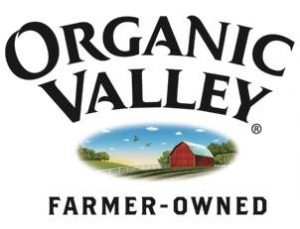 the Northeast following news last year that Horizon and Maple Hill Creamery would be terminating contracts with more than 130 family farms. Organic Valley, a farmer-owned co-operative since its founding in 1988, is offering 80 small, Northeast organic family farms a market for their dairy through a letter of intent.
the Northeast following news last year that Horizon and Maple Hill Creamery would be terminating contracts with more than 130 family farms. Organic Valley, a farmer-owned co-operative since its founding in 1988, is offering 80 small, Northeast organic family farms a market for their dairy through a letter of intent.
While Organic Valley is a national brand, they are committed to sustaining local farms including the more than 616 members in their Northeast Regional Pool. By working together through their co-operative, these family farms are able to negotiate for better prices, build economic efficiencies, and support one another through technical assistance and shared marketing. With the addition of new farmer-members in our region, food co-ops have an opportunity to contribute to the success of this effort by spreading the word and encouraging shoppers to sign on to the Northeast Organic Family Farm Partnership’s consumer pledge to increase their purchases from brands committed to sourcing from our region’s dairy farms, including Organic Valley.
“Our goal is to support the sustainability of organic dairy farms and rural economies here in our region,” said Erbin Crowell, Executive Director of the Neighboring Food Co-op Association (NFCA), the first retail organization to join the Partnership. “And we know that co-operatives such as Organic Valley that build the collective strength of family farmers and gives them more control over their future are key to this effort. We are so appreciative of their leadership in helping to save these farms and look forward to further collaboration.”
While the 80 families decide whether to join the co-operative, 10 Northeast organic family farms have already done so. One of the 10 families who joined the co-operative this month is the Osgoods of Osgood Family Farm in Vermont.
“My family began farming this land over 65 years ago. I’m glad to partner with Organic Valley to continue our family farm,” said George Osgood of Corinth, Vermont. “A co-operative owned by small family farms is the perfect fit for us. It gives us the chance to keep doing what we love.”
Over the last decade, New England and New York State have lost hundreds of individual dairy farms. As a co-operative borne out of the farm crisis of the 1980s, the issue of saving small family farms is core to Organic Valley. And with 100,000 small family farms being lost over the last decade due to consolidation and industrialization, the fight is not over.
“We are the only national brand still fighting for small family farms because we know that the best quality food is ethically sourced from small family farms,” said Bob Kirchoff, Organic Valley CEO. “With the help of consumers and customers across the country, we are helping solve the crisis of disappearing small family farms. We are creating the food system we all want—one that regenerates soil, cares for animals, nourishes people, and strengthens communities.”
For more information on Organic Valley, visit https://organicvalley.coop. Pledge your support for organic family dairy farms here in the Northeast: https://www.saveorganicfamilyfarms.org.
Act Now for climate justice! Join members of food co-ops across the Northeast in pledging to reduce waste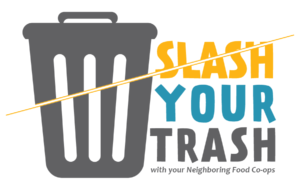 and ‘Slash Your Trash’ during the Month of April — the 52nd Anniversary of Earth Day in the U.S.
and ‘Slash Your Trash’ during the Month of April — the 52nd Anniversary of Earth Day in the U.S.
Did you know that the 292 million tons of waste (nearly 1,800 pounds per person every year) generated in the US in 2018 was primarily made up of plastics, paper, paperboard, and food? As individuals, we can take basic steps to reduce our waste. And working together with our co-ops as a community, we can have a big collective impact!
Join your local Food Co-op and co-op members across our region to Slash Your Trash!
It’s easily done:
- Pledge to take at least one of the actions to Slash Your Trash.
- Share Your Experience! Use “#SlashYourTrash”, “#NeighborCoops” and “#ActNow” and tag your local food co-op in social media posts letting friends know what you are doing.
- Visit the United Nations #ActNow Webpage and let them know about the actions you are taking on Climate Change: https://www.un.org/en/actnow/
Pledge Participants will be entered in raffles at participating Neighboring Food Co-ops.
Find out more: https://nfca.coop/slashyourtrash/
Brattleboro Food Co-op Hires New General Manager
Brattleboro Food Co-op hires Lee Bradford as General Manager
The Brattleboro Food Co-op Board of Directors is pleased to announce that Lee Bradford has been hired to be our next General Manager. Lee will begin work on March 21. He replaces Sabine Rhyne, the Co-op’s General Manager from 2015-2021. Lee brings over 26 years of business management expertise in a variety of industries. Most recently he held dual roles for C&S Wholesale Grocers in Fresno, CA as Vice President of Customer Service/Customer Experience, as well as General Manager of FreshKo Produce Services, a $100 million produce sales and distribution company, with over 150 employees.
The Board of Directors also recognizes Whitney Field, our Store Manager, who has served as the Interim General Manager since January 1. She has provided steady leadership during this transition to a new General Manager. Following Lee’s two-day in-person visit and interview at the Co-op, Whitney said, “Lee came across to me as someone who is humble and listens to and hears people’s concerns and really wants to help make a difference.”
Please join us in welcoming Lee Bradford to the Brattleboro Food Co-op. We believe that exciting opportunities lie ahead.
The Brattleboro Food Co-op was formed in 1975 as a small buying club, and now occupies a 16,000 square foot store in a four-story building right downtown that also includes offices, a community room, a cooking classroom, a commissary kitchen, and 24 apartments owned and managed by Windham and Windsor Housing Trust. Over 8,500 people own this vibrant organization dedicated to supporting a sustainable food system, built on co-operative principles.
March’s Cave to Co-op Artisan Cheese
Chin Clip, Mt. Mansfield Creamery, Morrisville, VT
Mt. Mansfield Creamery was started in June of 2009 by Stan Biasini and Debora Wickart. The cheese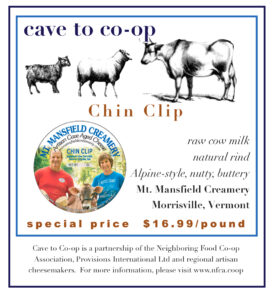 facility is in the heart of Morrisville, in the old United Farmers Creamery building. Not only did they renovate the building, but they also built their own cheese cave in the basement.
facility is in the heart of Morrisville, in the old United Farmers Creamery building. Not only did they renovate the building, but they also built their own cheese cave in the basement.
Debora milks about 30 cows per day and receives awards for the quality of milk produced. Stan, a graduate of Paul Smith’s College, has put his chef days behind him to concentrate on their recipes for cheese.
Stan transports their milk to the creamery on cheese making days. Debora milks the cows and still ships to St. Albans Cooperative. They make small batches of cheese only 8 to 12 times per month. They wash and brush the rinds to keep them thin to ensure that their products are one hundred percent edible. Their cheeses are made from milk from registered Holsteins and Brown Swiss cows that are on rotational grazing in the summer months and fed grain and hay during the winter.
Chin Clip is based on a recipe from the Austrian Alps and named for a notoriously difficult ski trail on Vermont’s Mt. Mansfield.
As we bridge the gap between chilly March days and the promise of spring, here is a recipe to try using this smooth, buttery, nutty, complex cheese.
Smoked Fish Salad w/Chin Clip and Root Vegetables
serves 4
- 1 small celeriac bulb, peeled, sliced into long thin strips
- 1 small fennel bulb, trimmed, cut into long thin strips
- 1 small shallot, thinly sliced
- 1 pound smoked bluefish or whitefish, bones and skin removed
- 1 cup flat leaf parsley, stems removed and coarsely chopped
- ¼ cup extra virgin olive oil
- zest and juice of 1 lemon
- salt and pepper to taste
- 2 ounces Chin Clip, shaved with vegetable peeler
Combine celeriac, fennel, shallot, fish, and parsley in large bowl. Add olive oil, lemon zest and juice; toss to coat. Spoon onto small plates. Top with cheese shavings.
Each month our Cave to Co-op partnership between Provisions International and the Neighboring Food Co-op Association (NFCA) offers a delicious regional cheese featured at a great price. Strengthening our local and regional farmers and producers by supporting artisanal cheesemakers is a key goal of the Cave to Co-op program.
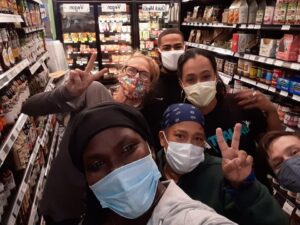
When you work at your local food co-op, you’re part of something bigger: You’re also helping to grow a more healthy, just & sustainable food system that works for everyone!
Want to develop new skills, advance your career, and do meaningful work for a business that makes a difference in your community? Come join the co-op team!
From our beginnings, co-ops have been guided by a commitment to shared values of democracy, equality, equity, and solidarity. And across our region, food co-ops have been pioneers in healthy food, sustainable agriculture, and building a more inclusive economy that works for everyone.
Not only is working at your local co-op truly meaningful, it’s also fun working with others who also want to help build a better world. We’d love for you to be part of our co-op community and work to build a more healthy, just, and sustainable food system and a more inclusive economy.
Get more info and to help spread the word: https://nfca.coop/co-opjobs.
Farmers Union: Food Co-ops & Local Producers Collaboration
Rob Larew, President of National Farmers Union, addressed the 11th Annual Meeting of the NFCA, highlighting collaboration among food co-ops and local producers, and opportunities for policy advocacy.
“I want to start by giving thanks to NFCA member food co-ops for the important work and dedication that you bring each and every day to supporting family farmers and their communities locally and nationally,” said Larew. “We have a shared commitment to co-operative enterprise and I want to recognize NFCA’s important collaboration with the Farmers Union this past year on lifting up and growing our co-operative education message.”
you bring each and every day to supporting family farmers and their communities locally and nationally,” said Larew. “We have a shared commitment to co-operative enterprise and I want to recognize NFCA’s important collaboration with the Farmers Union this past year on lifting up and growing our co-operative education message.”
Larew highlighted the Farmers Union’s Fairness for Farmers campaign, which advocates for stronger enforcement of antitrust laws and breaking up the corporate monopolies that use their size to unfairly take advantage of farmers and ranchers while forcing consumers to pay higher prices at the grocery store, and pointed to opportunities for collaboration among producers and consumers in food system advocacy.
“I want to point out that we have midterm elections coming up, we have Farm Bill negotiations on the horizon, and the need to make sure that Northeast farmers and consumers are well represented in these dialogues is now more important than ever,” said Larew. “So, I ask that in addition to all the important work that you do that you continue to take advantage of this particular moment and join New England Farmers Union, to encourage your members and shoppers to join and encourage your farmer partners to join as we work to build a fairer, more sustainable and inclusive food system.”
The Neighboring Food Co-op Association (NFCA) is an affiliate member of the New England Farmers Union, reflecting our commitment to partnership with family farmers in policy advocacy and co-operative development.
To view Rob Larew’s full comments, visit the NFCA YouTube Channel. And for more information on the New England Farmers Union, visit www.newenglandfarmersunion.org.
Our Local Farmers & Fishermen Need You!
Do you care about where your food comes from and want to support the people who produce it? Join the NEFU as a Friend of the Farmer for just $15. Your membership will help ensure that our region’s producers and consumers are heard by policy makers here at home and in Washington, DC. For more information, please visit www.newenglandfarmersunion.org.
A Virtual Road Race for Co-op Development, April 23 – 29, 2022!
The Co-op 5k is a fun, family-friendly event and fundraiser for the Cooperative Development Foundation. Walk, run, roll or stroll with your Neighboring Co-operators as we defend our title for “Most Co-op Spirit”!
Find More Co-op Events: https://nfca.coop/calendar
The Neighboring Food Co-op Association (NFCA) is a co-operative federation of over 40 food co-ops and startup initiatives across New England, working together toward a shared vision of a thriving co-operative economy, rooted in a healthy, just, and sustainable food system and a vibrant community of co-operative enterprise.


